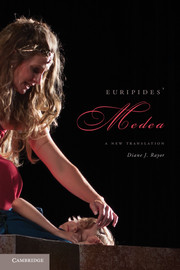Allan, W. 2002. Euripides: Medea. Duckworth companions to Greek and Roman tragedy. London: Duckworth.
Blundell, M. W. 1989. Helping friends and harming enemies: A study in Sophocles and Greek ethics. Cambridge: Cambridge University Press.
Boedeker, D. 1997. “Becoming Medea: assimilation in Euripides.” In Medea. Eds., Clauss, J. J. and Johnston, S. I., 127–48. Princeton: Princeton University Press.
Buchan, M. 2008. “‘Too difficult for a single man to understand’: Medea's out-jutting foot.” Helios 35 (1): 3–28.
Cahill, J. 1995. Her kind: stories of women from Greek mythology. Orchard Park, NY: Broadview Press.
Clauss, J. J. and Johnston, S. I., eds. 1997. Medea. Princeton: Princeton University Press.
Didaskalia: Journal for Ancient Performance. .
Dunn, F. 1994. “Euripides and the rites of Hera Akraia.” Greek, Roman and Byzantine Studies 35 (1): 103–15.
Ebbott, M. 2005. “Marginal figures.” In A companion to Greek tragedy. Ed. Gregory, J., 366–76. Malden, MA: Blackwell Publishing.
Easterling, P. E. 2003. “The infanticide in Euripides’ Medea.” In Oxford readings in classical studies: Euripides. Ed. Mossman, J., 187–200. Oxford: Oxford University Press.
Easterling, P. E., ed. 1997. The Cambridge companion to Greek tragedy. Cambridge: Cambridge University Press.
Euripides, . 2008. Fragments: Aegeus-Meleager, vol. 7 (Loeb Classical Library #504). C. Collard and M. Cropp, ed. and trans. Cambridge, MA: Harvard University Press.
Euripides, . 2009. Fragments: Oedipus-Chrysippus and other fragments, vol. 8 (Loeb Classical Library #506). C. Collard and M. Cropp, ed. and trans. Cambridge, MA: Harvard University Press.
Foley, H. 1989. “Medea's divided self.” Classical Antiquity 8 (1): 61–85.
Foley, H.. 2001. Female acts in Greek tragedy. Princeton: Princeton University Press.
Friedrich, R. 1993. “Medea apolis: on Euripides’ dramatization of the crisis of the polis.” In Tragedy, comedy, and the polis. Eds. Sommerstein, A., Halliwel, S., Henderson, J., Zimmerman, B., 219–39. Bari: Levante.
Gantz, T. 1993. Early Greek myth: a guide to literary and artistic sources, Vol. 1: 358–73. Baltimore, MD: Johns Hopkins University Press.
Goldhill, S. 2007. How to stage Greek tragedy today. Chicago: University of Chicago Press.
Gould, J. 1973. “Hiketeia.” Journal of Hellenic Studies 93: 74–103.
Gregory, J. 2005. “Euripidean tragedy.” In A companion to Greek tragedy. Ed. Gregory, J., 251–70. Malden, MA: Blackwell Publishing.
Griffiths, E. 2006. Medea. London: Routledge.
Hall, E., Macintosh, F., and Taplin, O., eds. 2000. Medea in Performance: 1500–2000. Oxford: Oxford University Press.
Hart, M. L. 2010. Art of ancient Greek theater. Los Angeles: J. Paul Getty Museum.
Holland, L. L. 2008. “Last act in Corinth: the burial of Medea's children (E. Med. 1378–83).” Classical Journal 103 (4): 407–30.
Johnston, S. I. 1997. “Corinthian Medea and the cult of Hera Akraia.” In Medea. Ed. Clauss, J. J. and Johnston, S. I., 44–70. Princeton: Princeton University Press.
Knox, B. M. W. 1979. Word and action: essays on the ancient theater, 295–322. Baltimore, MD: Johns Hopkins University Press.
Kovacs, D. 1993. “Zeus in Euripides’ Medea.” American Journal of Philology 114 (1): 45–70.
Mastronarde, D. J. ed. 2002. Euripides: Medea. Cambridge: Cambridge University Press. My translation is based on this Greek edition and commentary.
Mastronarde, D. J.. 2010. The art of Euripides: dramatic technique and social context. Cambridge: Cambridge University Press.
McClure, L. 1999a. “‘The worst husband’: discourses of praise and blame in Euripides’ Medea.” Classical Philology 94 (4): 373–94.
McClure, L.. 1999b. Spoken like a woman: speech and gender in Athenian drama. Princeton: Princeton University Press.
Mendelsohn, D. 2008. “The bad boy of Athens.” In How beautiful it is and how easily it can be broken, 408–25. New York: HarperCollins Publishers.
Mezzabotta, M. R. 1994. “Jason and Orpheus: Euripides’ Medea 543.” American Journal of Philology 115 (1): 47–50.
Most, G. W. 1999. “Two problems in the third stasimon of Euripides’ Medea.” Classical Philology 94 (1): 20–35.
Mueller, M. 2001. “The language of reciprocity in Euripides’ Medea.” American Journal of Philology 122 (4): 471–504.
Newton, R. M. 1985. “Ino in Euripides’ Medea.” American Journal of Philology 106 (4): 496–502.
Padel, R. 1995. Whom gods destroy. Princeton: Princeton University Press.
Page, D. L. 1938. Euripides, Medea. Oxford: Oxford University Press.
Rayor, D. J., ed. and trans. 1991. Sappho's lyre: Archaic lyric and women poets of ancient Greece. Berkeley: University of California Press.
Reckford, K. J. 1968. “Medea's first exit.” Transactions and Proceedings of the American Philological Association 99: 329–59.
Schein, S. L. 1990. “Philia in Euripides’ Medea.” In Cabinet of the Muses. Eds. Griffith, M. and Mastronarde, D. J., 57–73. Atlanta, GA: Scholars Press.
Scodel, R. 2010. An introduction to Greek tragedy. Cambridge: Cambridge University Press.
Segal, C. 1997. “On the fifth stasimon of Euripides’ Medea.” American Journal of Philology 118 (2): 167–84.
Taplin, O. 2003. Greek tragedy in action. 2nd ed. London: Routledge.
Winkler, J. and Zeitlin, F., eds. 1990. Nothing to do with Dionysus?Princeton: Princeton University Press.
Wolf, C. 1998. Medea: a modern retelling. New York: Doubleday.
Worthington, I. 1990. “The ending of Euripides’ ‘Medea’.” Hermes 118 (4): 502–5.





